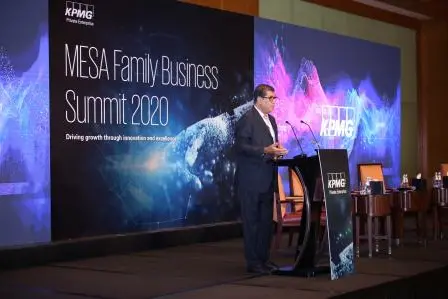PHOTO
Family businesses in the Middle East & South Asia (“MESA”) region are looking at the next stage of growth by considering innovation, geographical expansion, governance and succession planning. These trends were discussed at the recently concluded KPMG MESA Family Business Summit themed ‘driving growth through innovation and excellence’ which took place in Dubai.
The event was attended by more than one hundred delegates from prominent family owned companies in attendance, of which, 35 delegates were representing family businesses in Bahrain. This includes Hala Yateem, Director at A M Yateem Brothers, who was a key guest speaker. KPMG in Bahrain’s Managing Partner, Jamal Fakhro, was a keynote speaker where he provided a regional perspective on the issues and challenging facing family businesses according to the GCC Family Business Survey conducted by KPMG in the region.
Reyaz Mihular, Chairman at KPMG MESA highlighted changes in the technology landscape which are triggering new opportunities and challenges for family businesses in the region. He added that businesses should be agile and innovative to succeed in this new normal.
At a global level, Randel Carlock, Professor in Entrepreneurial Leadership at INSEAD, spoke on the topic ‘driving business culture with family values’ describing examples of how many global family businesses prospered by emphasizing innovation within organizational culture.
Tom McGinness, Global Co-Leader for Family Business at KPMG International presented key findings from the STEP 2019 Global Family Business Survey, a publication sponsored by the KPMG Enterprise Center of Excellence for Family Business. The survey depicted the emergence of millennial family business leaders, with refreshed outlook and priorities.
The Summit was facilitated by Harish Gopinath, Head of Family Business & Private Enterprise at KPMG MESA. He commented during the event and said “Family businesses are the backbone of the economies. Therefore, we need to support them stay in business and avoid disruption due to family issues, and help them ensure smooth transition from generation to another. KPMG recognizes Family businesses as a significant sector and endeavors to work closely with family companies and private enterprises to drive growth through innovation and excellence.”
Speakers and panel members included Abdulla Fareed Al Gurg – Group CEO, Easa Saleh Al Gurg Group; Subramaniam Eassuwaren – Director, Eswaran Brothers; Tharwat Amer – Group CFO, SEDCO Holding; Nader Haffar, Chairman & CEO, KPMG Lower Gulf and Neeraj Gupta – Head of Data & Analytics, KPMG in Saudi Arabia.
KPMG Private Enterprise teams work alongside many family owned companies across areas such as growth, risk, governance, wealth, people and transition.
-Ends-
© Press Release 2020Disclaimer: The contents of this press release was provided from an external third party provider. This website is not responsible for, and does not control, such external content. This content is provided on an “as is” and “as available” basis and has not been edited in any way. Neither this website nor our affiliates guarantee the accuracy of or endorse the views or opinions expressed in this press release.
The press release is provided for informational purposes only. The content does not provide tax, legal or investment advice or opinion regarding the suitability, value or profitability of any particular security, portfolio or investment strategy. Neither this website nor our affiliates shall be liable for any errors or inaccuracies in the content, or for any actions taken by you in reliance thereon. You expressly agree that your use of the information within this article is at your sole risk.
To the fullest extent permitted by applicable law, this website, its parent company, its subsidiaries, its affiliates and the respective shareholders, directors, officers, employees, agents, advertisers, content providers and licensors will not be liable (jointly or severally) to you for any direct, indirect, consequential, special, incidental, punitive or exemplary damages, including without limitation, lost profits, lost savings and lost revenues, whether in negligence, tort, contract or any other theory of liability, even if the parties have been advised of the possibility or could have foreseen any such damages.




















